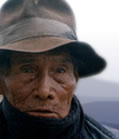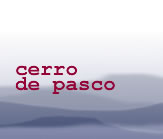Luis has lived in Quiulacocha all his life. He was elected by his community to be the judge of peace which means he has authority and power to make decisions within the existing organisational structures of the community.
He discusses the community organisation in depth and then goes on to talk about changes in productive activity that have occurred. These changes are due to the pollution, the influence of mining on the community and the fact that the mining industry has brought very few developments or benefits to the community.
He gives a moving account of a custom now made impossible by the pollution - the family parties by the river on Sundays while the women washed clothes - and talks about other customs that have changed, such as marriage and fiestas (festivals, celebrations).
Finally, he talks about migration and how young people need a more secure environment then the community which is threatened with relocation, harmful to the children's health and has few prospects for employment.
|
You will need a password from Panos to view the full
transcript of the interview. To apply for a password, click here.
Once you have a password, click here to go to the beginning
of the transcript. You can also click on any section of the
breakdown of content below and go straight to the
corresponding part of the transcript.
|
| Section 1 |
Talks about his role as judge of peace in the community and the relationship of this position to the other authorities in the community
|
| Section 1-2 |
Changes in community organisation
|
| Section 2 |
" paco"- mix of gold and silver that used to be mined in the area
Changes in productive activities - have become traders of meat, keep sheep, cows, alpacas, llamas, used to grow potatoes, used to fish in rivers.
|
| Section 3 |
Fish, frogs and birds have disappeared because of pollution.
New activities – traders, teachers, bakers.
Mining – miners work for themselves and don't help community
|
| Section 4 |
History of mining – gringos (North Americans who ran/owned the mines) taking all wealth away and not bringing any benefits; community weren't made aware that mines were to be nationalised.
|
| Section 5 |
Contamination came before gringos; claims neither Cerro de Pasco or Centromin brought any developments or benefits; mentions people being laid off now; claims this community was never a mining community though some people went to work in Cerro de Pasco.
|
| Section 6 |
Talks about changing customs particularly the old custom of everybody going down to the lake on Sundays to wash clothes, people would cook by the river, drink wine and generally celebrate.
This is no longer possible because of the pollution. Explains meaning of Quiulacocha (Quiula – seagull, cocha – lagoon). Today the seagulls have gone, the lagoon’s polluted. Contamination started with extension of mines; claims water's bad for health
|
| Section 7 |
Fiestas: Baile Viejo (“old dance”); Christmas; marriages – sometimes go on for days but are not as good as before as people have less resources
|
| Section 7-8 |
Marriage. Before: formal procedure of asking for a woman's hand; families used to get to know each other; mainly married inside community; parents wouldn't approve their daughter’s wedding if man didn't have enough resources. Now: less formality, more living together, marry outside community
|
| Section 8 |
Migration - young people more adventurous and go to find work
|
| Section 8-9 |
Talks about his children who are settled in Lima and Huancayo; less prospects in community and not very secure. Contamination getting worse all the time - harmful to health, no water even for cattle. However claims he wouldn't be happy if the community was relocated by Centromin
Lost land to Yanahuanca community but didn't fight because need support of other communities
|
| Section 10 |
Joint activities against pollution; people who leave come back only to visit and to take benefits from cooperative
|
| Section 10-11 |
Community organisation and how it’s changed.
To be a member of the cooperative need to have been a comunero for 5 years. Community decision-making processes.
Government help: received truck and some alpacas, but no help for school.
|
| Section 11-12 |
Contaminated water killed animals at first, now animals stay thin and don't produce much wool. Pasture and air also polluted so people’s health suffers, too.
|
| Section 12 |
Children's health damaged - dental cavities, thinning of hair. House roofs being eroded by chemicals in air. Going to be doubly contaminated as they're digging ditch which will pass through Quiulacocha to take away waste waters. Haven't won any trials against Centromin – they don’t have enough money for a court case
|
| Section 13 |
Benefits from Centromin = sports complex and a park, milk project and drinking water but projects aren't completed. Claims they could overcome things with help from government and if company stopped pollution. Hopes this interview will help people to understand problems faced by his community.
|


